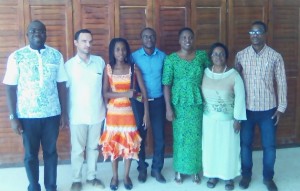
Mar 28, 2016 | Focolare Worldwide
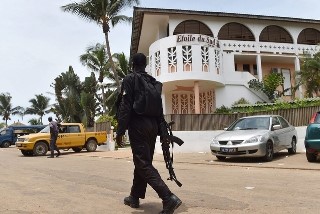 “Last March 13, the Ivory Coast and the entire world learned to their surprise that the seaside city of Grand-Bassam had been hard struck by unknown assailants and that it was difficult to know the number of victims,” write Jeanne Kabanga and Damase Djato from the Focolare in Abidjan. “One can imagine the slaughter with all the people that go there every week to rest on the shore in front of the hotel they call the star of the south. It is a place visited mostly by tourists of every provenance. Grand-Bassam had been the first capital of the Ivory Coasts and is classified as a UNESCO World Heritage Sight.”
“Last March 13, the Ivory Coast and the entire world learned to their surprise that the seaside city of Grand-Bassam had been hard struck by unknown assailants and that it was difficult to know the number of victims,” write Jeanne Kabanga and Damase Djato from the Focolare in Abidjan. “One can imagine the slaughter with all the people that go there every week to rest on the shore in front of the hotel they call the star of the south. It is a place visited mostly by tourists of every provenance. Grand-Bassam had been the first capital of the Ivory Coasts and is classified as a UNESCO World Heritage Sight.”
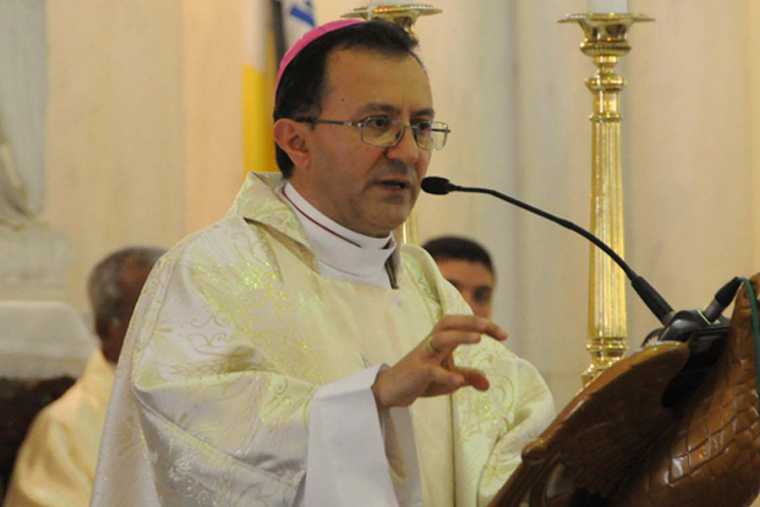
Msgr Joseph Spiteri
 Within such a context, the presentation of the Economy of Communion which, in the Ivory Coast has already made some moves and turned out to be a possible antidote to the poverty and misery: small actions like Firmin’s teaching activity a quarter of Abidjan. And the signature campaign for peace brought out the personal commitment of each person. “It was only when we got home,” Jeanne and Damase continue, “that we learned from the television news about the attack in Grand-Bassam. After a day of listening to talk about peace and experiencing peace, we feel a clear call to be workers of peace, putting into practice what we learned and, above all, living peace within and amongst ourselves in order to give it to the people around us. It seems to us that this is the only way we will be able to give our contribution to defuse terrorism and every sort of hatred.”
Within such a context, the presentation of the Economy of Communion which, in the Ivory Coast has already made some moves and turned out to be a possible antidote to the poverty and misery: small actions like Firmin’s teaching activity a quarter of Abidjan. And the signature campaign for peace brought out the personal commitment of each person. “It was only when we got home,” Jeanne and Damase continue, “that we learned from the television news about the attack in Grand-Bassam. After a day of listening to talk about peace and experiencing peace, we feel a clear call to be workers of peace, putting into practice what we learned and, above all, living peace within and amongst ourselves in order to give it to the people around us. It seems to us that this is the only way we will be able to give our contribution to defuse terrorism and every sort of hatred.”
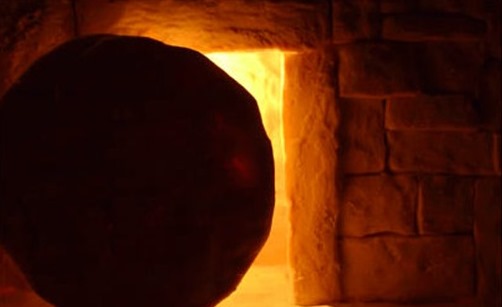
Mar 27, 2016 | Non categorizzato
 “A providential circumstance led me to examining in depth the reality of Jesus who, after his abandonment and death on the cross, rose from the dead. Not only, but I had the opportunity to meditate intensely with my mind and heart on many details of Jesus’ resurrection and on his life after the resurrection. I was dumbfounded (this is the exact word) at the majesty, the magnificence that emanated from this divine event, by the uniqueness of the risen Lord, by this supernatural fact which, as far as I know, is unique in the world. For this reason, I cannot help but highlight it again this time. … The resurrection is what most characterizes Christianity, what distinguishes Jesus, its founder. The fact that he is risen! Risen from the dead! Not in the way that others rose, like Lazarus, for instance, who then, when his time came, died. Jesus is risen never to die again. He continues to live, also as a man, in heaven, in the heart of the Trinity. Five hundred people saw him! And he certainly wasn’t a ghost. It was him, really him. He told Thomas, “Put your finger here and see my hands. Reach out your hand and put it into my side” (Jn 20:27). He ate with his disciples; he spoke with them; he stayed with them for as long as forty days. He had renounced his infinite greatness out of love for us and he had made himself small, a man among men, like one of us. … In rising from the dead, he broke, he surpassed, all the laws of nature, of the entire cosmos and, by doing so, he showed that he is greater than all that exists, greater than all that he created, greater than all that can be imagined. Consequently, even if we have just an intuition of this truth, we cannot help but see him as God. We cannot help but do as Thomas did and fall down on our knees in adoration before him, confessing in all sincerity: “My Lord and my God.” … And I saw with new eyes what he did during those fabulous new days on earth. After an angel came down from heaven, overturned the stone of his sepulchre and announced his resurrection, the risen Lord appeared first of all to Mary Magdalene, the former sinner, because he had become man for sinners. Then we find him walking along the road to Emmaus. Great and immense as he was, he becomes the first exegete and explains the Scriptures to the two disciples. Then we see him as the founder of his Church, laying his hands on his disciples to give them the Holy Spirit; we hear him saying extraordinary words to Peter whom he places as the head of his Church. Then he sends the disciples into the world to announce the Gospel, the new Kingdom he founded in the name of the Most Holy Trinity from where he descended and to where, with his coming ascension, he will return. … And, because he is risen, the words he said to us before his death acquire unique brilliance and express indisputable truths. First and foremost, the words announcing the fact that we too will rise. I knew it and believed it before, because I am a Christian. But now I am doubly sure: I will rise, we will rise. …” Chiara Lubich, In unità verso il Padre, Città Nuova editrice, Roma 2004, p.102-105
“A providential circumstance led me to examining in depth the reality of Jesus who, after his abandonment and death on the cross, rose from the dead. Not only, but I had the opportunity to meditate intensely with my mind and heart on many details of Jesus’ resurrection and on his life after the resurrection. I was dumbfounded (this is the exact word) at the majesty, the magnificence that emanated from this divine event, by the uniqueness of the risen Lord, by this supernatural fact which, as far as I know, is unique in the world. For this reason, I cannot help but highlight it again this time. … The resurrection is what most characterizes Christianity, what distinguishes Jesus, its founder. The fact that he is risen! Risen from the dead! Not in the way that others rose, like Lazarus, for instance, who then, when his time came, died. Jesus is risen never to die again. He continues to live, also as a man, in heaven, in the heart of the Trinity. Five hundred people saw him! And he certainly wasn’t a ghost. It was him, really him. He told Thomas, “Put your finger here and see my hands. Reach out your hand and put it into my side” (Jn 20:27). He ate with his disciples; he spoke with them; he stayed with them for as long as forty days. He had renounced his infinite greatness out of love for us and he had made himself small, a man among men, like one of us. … In rising from the dead, he broke, he surpassed, all the laws of nature, of the entire cosmos and, by doing so, he showed that he is greater than all that exists, greater than all that he created, greater than all that can be imagined. Consequently, even if we have just an intuition of this truth, we cannot help but see him as God. We cannot help but do as Thomas did and fall down on our knees in adoration before him, confessing in all sincerity: “My Lord and my God.” … And I saw with new eyes what he did during those fabulous new days on earth. After an angel came down from heaven, overturned the stone of his sepulchre and announced his resurrection, the risen Lord appeared first of all to Mary Magdalene, the former sinner, because he had become man for sinners. Then we find him walking along the road to Emmaus. Great and immense as he was, he becomes the first exegete and explains the Scriptures to the two disciples. Then we see him as the founder of his Church, laying his hands on his disciples to give them the Holy Spirit; we hear him saying extraordinary words to Peter whom he places as the head of his Church. Then he sends the disciples into the world to announce the Gospel, the new Kingdom he founded in the name of the Most Holy Trinity from where he descended and to where, with his coming ascension, he will return. … And, because he is risen, the words he said to us before his death acquire unique brilliance and express indisputable truths. First and foremost, the words announcing the fact that we too will rise. I knew it and believed it before, because I am a Christian. But now I am doubly sure: I will rise, we will rise. …” Chiara Lubich, In unità verso il Padre, Città Nuova editrice, Roma 2004, p.102-105
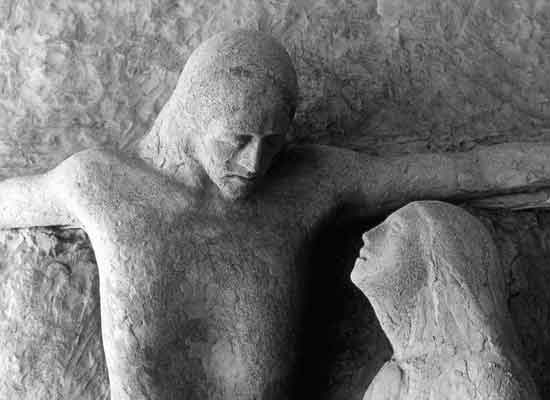
Mar 26, 2016 | Non categorizzato

Ave Cerquetti, ‘Crucifixion’ – Lienz (Austria) 1975
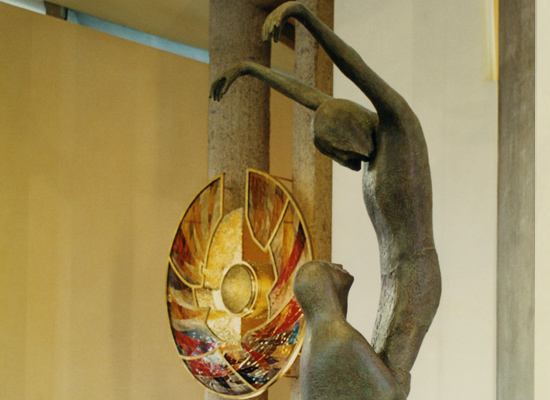
Mar 25, 2016 | Non categorizzato

©Ave Cerquetti, ‘L’unico Bene’ – Mariapolis Ginetta (Brazil) 1998

Mar 24, 2016 | Focolare Worldwide, Senza categoria
 “I’ve never been so close to the site of a terrorist attack. Nowadays we are somewhat accustomed to seeing such catastrophes everyday on the news but passing in front of the metro station only a few minutes before and thinking that it was so close by and not knowing exactly what to do is quite another thing. I’m a firm believer that a united world is possible. Through my commitment in New Humanity, but mostly through the small daily actions, I try to live and act in a spirit of fraternity that is also expressed in the Universal Declaration of Human Rights. But, as the news came and the howling of sirens intensified outside my window, I was blown away. Okay, it was all so close by, but still what could I do? Stay put and respond to all the messages from friends and relatives who were asking for news? Should I take to the streets and go to help who knows who and how? Should I keep working as if nothing had occurred? It was surreal, and I found myself disoriented and helpless. It also made me question the meaning of it all. What could have moved them to push some young people like me to hate to the point of being ready to sacrifice their lives in order to kill so many defenseless passengers, chosen at random and pressed into a packed metro car? I wondered what crime I would had committed that I should have to die with them. I could not find any satisfactory answers in any of the theories I had learned at university in political science class. What did give me some light was the memory of the previous evening spent with several youth who are engaged in living the same commitment as me, and during that evening we had promised another time to be instruments of brotherhood and dialogue for the people around us. Trying to put aside my confusion, I realized that, in those moments, it was (almost) as if I was experiencing the war in my own skin, all the more reason to be a peacemaker beginning with the people who were with me at the moment. Colleagues, friends and acquaintances… in spite of the terror and shock, I slowly began to realize that I was not the only one to think so. Everybody – each in their own way we’re dealing with their emotions – none of them found words of hate for what had happened, but everyone was convinced that dialogue was the only way possible to respond to such insane acts. The words spoken by Chiara Lubich, founder of New Humanity and the Focolare Movement, when she was awarded the UNESCO Peace Education Prize in December 1996, seemed truer to me than ever. “Anybody who would like to clear today’s mountains of hatred and violence finds themselves in front of an immense and weighty task. But what is impossible to millions of isolated and divided individuals, seems possible once they make mutual love, mutual understanding and unity the essential activity of their life.”
“I’ve never been so close to the site of a terrorist attack. Nowadays we are somewhat accustomed to seeing such catastrophes everyday on the news but passing in front of the metro station only a few minutes before and thinking that it was so close by and not knowing exactly what to do is quite another thing. I’m a firm believer that a united world is possible. Through my commitment in New Humanity, but mostly through the small daily actions, I try to live and act in a spirit of fraternity that is also expressed in the Universal Declaration of Human Rights. But, as the news came and the howling of sirens intensified outside my window, I was blown away. Okay, it was all so close by, but still what could I do? Stay put and respond to all the messages from friends and relatives who were asking for news? Should I take to the streets and go to help who knows who and how? Should I keep working as if nothing had occurred? It was surreal, and I found myself disoriented and helpless. It also made me question the meaning of it all. What could have moved them to push some young people like me to hate to the point of being ready to sacrifice their lives in order to kill so many defenseless passengers, chosen at random and pressed into a packed metro car? I wondered what crime I would had committed that I should have to die with them. I could not find any satisfactory answers in any of the theories I had learned at university in political science class. What did give me some light was the memory of the previous evening spent with several youth who are engaged in living the same commitment as me, and during that evening we had promised another time to be instruments of brotherhood and dialogue for the people around us. Trying to put aside my confusion, I realized that, in those moments, it was (almost) as if I was experiencing the war in my own skin, all the more reason to be a peacemaker beginning with the people who were with me at the moment. Colleagues, friends and acquaintances… in spite of the terror and shock, I slowly began to realize that I was not the only one to think so. Everybody – each in their own way we’re dealing with their emotions – none of them found words of hate for what had happened, but everyone was convinced that dialogue was the only way possible to respond to such insane acts. The words spoken by Chiara Lubich, founder of New Humanity and the Focolare Movement, when she was awarded the UNESCO Peace Education Prize in December 1996, seemed truer to me than ever. “Anybody who would like to clear today’s mountains of hatred and violence finds themselves in front of an immense and weighty task. But what is impossible to millions of isolated and divided individuals, seems possible once they make mutual love, mutual understanding and unity the essential activity of their life.”
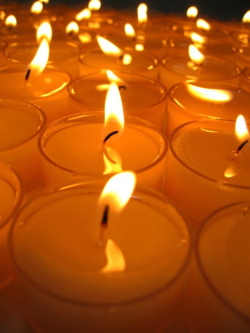
Mar 24, 2016 | Non categorizzato
 “The orientation of the Gospel of St. John, and also the others, converge in the phrase which has lately taken on a deep and infinite meaning for me: “That they all be one, as you Father are in me and I in you, so that the world may believe.” (John 17,21). This is how we should live. […] These are the coordinates of the unity that is particularly dear to me: unity in our parishes, unity in the various services and ministries, unity between the clergy and the laity, and between presbyteries. Unity becomes credible only if it demonstrates that we are not the patrons, but that only He is the Lord. This unity in the context of priestly ministry is something I particularly hold dear. Likewise I must mention unity of the Church, unity with those who are outside the confines of our Roman-Catholic Church, unity among all those who identify themselves with faith in the only God, the Living God and, therefore, with the Jews and Muslims. That unity between the Church and society is where one does not run parallel to or contrast with the other, but where the Church and society enter into a mutual relationship, bringing to light that unity which God gives for leavening society, with that leaven which makes man free. It is unity that makes man fully man, since he can become man in the full sense only where God has the right to be fully God, and thus can endow us with all He wishes to give us. And He wants to give us nothing less than His intimate mystery: Trinitarian unity. But this is not a simple plan, since we do not progress much only with plans. Instead it has to become life […]. Also I have to start living this unity. It is due to this that I trust the fact that all of you dear brothers and sisters can help me, and that we can do so mutually.” Bishop Klaus Hemmerle Cited from: W. Hagemann, Klaus Hemmerle. Innamorato della Parola di Dio. (In love with the Word of God), Città Nuova ed., Roma 2013, pp. 337-338
“The orientation of the Gospel of St. John, and also the others, converge in the phrase which has lately taken on a deep and infinite meaning for me: “That they all be one, as you Father are in me and I in you, so that the world may believe.” (John 17,21). This is how we should live. […] These are the coordinates of the unity that is particularly dear to me: unity in our parishes, unity in the various services and ministries, unity between the clergy and the laity, and between presbyteries. Unity becomes credible only if it demonstrates that we are not the patrons, but that only He is the Lord. This unity in the context of priestly ministry is something I particularly hold dear. Likewise I must mention unity of the Church, unity with those who are outside the confines of our Roman-Catholic Church, unity among all those who identify themselves with faith in the only God, the Living God and, therefore, with the Jews and Muslims. That unity between the Church and society is where one does not run parallel to or contrast with the other, but where the Church and society enter into a mutual relationship, bringing to light that unity which God gives for leavening society, with that leaven which makes man free. It is unity that makes man fully man, since he can become man in the full sense only where God has the right to be fully God, and thus can endow us with all He wishes to give us. And He wants to give us nothing less than His intimate mystery: Trinitarian unity. But this is not a simple plan, since we do not progress much only with plans. Instead it has to become life […]. Also I have to start living this unity. It is due to this that I trust the fact that all of you dear brothers and sisters can help me, and that we can do so mutually.” Bishop Klaus Hemmerle Cited from: W. Hagemann, Klaus Hemmerle. Innamorato della Parola di Dio. (In love with the Word of God), Città Nuova ed., Roma 2013, pp. 337-338

Mar 24, 2016 | Non categorizzato
 |
“Looking at this profoundly wounded world, unity and peace might seem just a dream.
May the power of the Risen Lord, who overcame death, every death, forever, strengthen in us the boldness to believe, hope and act so that fraternity may become the norm for shared living between different cultures and peoples.
I wish you all a Happy Easter, with the Risen Jesus in our midst!”
Maria Voce (Emmaus)
|
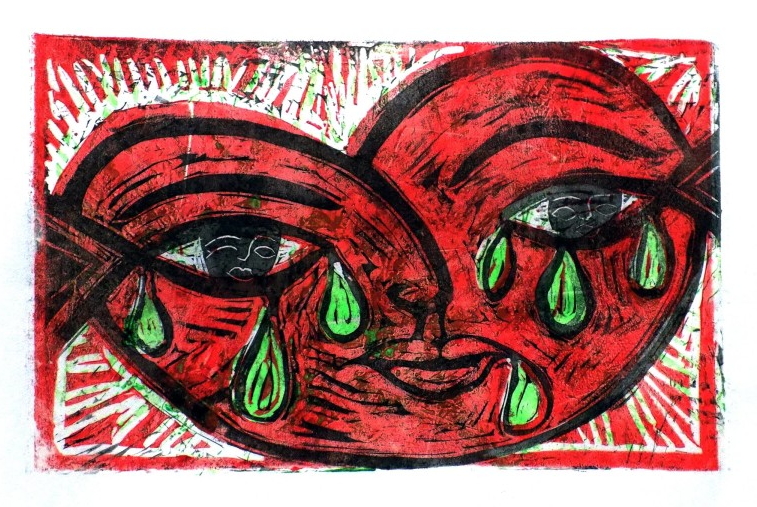
Mar 23, 2016 | Focolare Worldwide

“A Bruxelles, Dieu pleure avec nous” © Michel Pochet

Mar 23, 2016 | Non categorizzato
 God weeps with us in Brussels I was there on that Tuesday morning in Brussels
God weeps with us in Brussels I was there on that Tuesday morning in Brussels
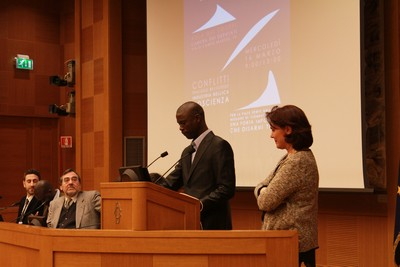
Mar 23, 2016 | Focolare Worldwide, Senza categoria
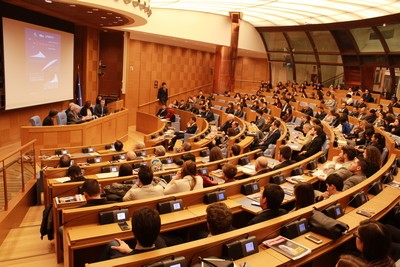 Faced with the increasingly untenable situation of widespread armed conflict, large fringes of civil society continue to make noise in an effort to curb the actions of governments that with their choices support arms trafficking, which is identified as one of the causes that prevents resolutions to the conflicts. The Political Movement for Unity has long been engaged on this issue. Through its Città Nuova, the Political Movement for Unity and especially its schools on participation in politics, it continues to expose the involvement of Italy in the production of war. The country, in fact home to strategic military bases, continues to produce high-tech weapons that also arrive in Middle Eastern countries, as reported by Città Nuova. Bombs are transited from the ports of Sardegna destined for Saudi Arabia, a country interested in the Syrian conflict and driving a coalition committed to the war in Yemen, with thousands of victims and condemned by the UN.
Faced with the increasingly untenable situation of widespread armed conflict, large fringes of civil society continue to make noise in an effort to curb the actions of governments that with their choices support arms trafficking, which is identified as one of the causes that prevents resolutions to the conflicts. The Political Movement for Unity has long been engaged on this issue. Through its Città Nuova, the Political Movement for Unity and especially its schools on participation in politics, it continues to expose the involvement of Italy in the production of war. The country, in fact home to strategic military bases, continues to produce high-tech weapons that also arrive in Middle Eastern countries, as reported by Città Nuova. Bombs are transited from the ports of Sardegna destined for Saudi Arabia, a country interested in the Syrian conflict and driving a coalition committed to the war in Yemen, with thousands of victims and condemned by the UN. 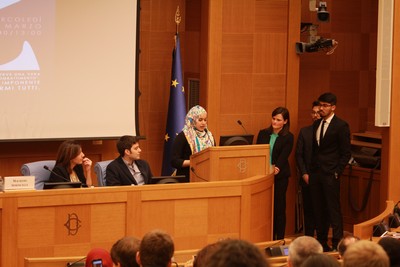 What to do then? A year of work accompanied by experts of international geopolitics, led to the drafting of an appeal made of concrete demands, presented to the deputies and senators available: • Respect for 185/90 Law, concerning the “export control, import and transit of military goods.” In particular, it asks for the termination of exportation and transiting on the national territory to direct weapons to countries in conflict or who are committing serious human rights violations. • The allocation of funds for the conversion of the military industry into civil purposes, with reference to the provisions in Art.1 paragraph 3 of the 185/90 Law. • Transparency and control of banking transactions related to imports, exports and the transit of arms. To these were also added the request for the insertion of the themes of integration and welcome in the political agenda, and the investment of more resources in international cooperation. The youth promoters of the March 16th Meeting are well aware of the powers that be and the apparent judgment, even benevolent, of naivety that accompanies their concerns, but, as they say: “We believe we have a responsibility, due precisely to the ideals that motivate us, and therefore we cannot be silent or passive as we look at the world around us. We work in our daily lives to build fraternity and that is where we begin from in engaging governors.” The reflection in Parliament was enriched by the contributions of Pasquale Ferrara, diplomat and university professor Interrnational Relations; Shahrzad Houshmand, Islamic theologian who teaches at the Pontifical Gregorian University; Michele Zanzucchi, director of Città Nuova; and Professor Maurizio Simoncelli, co-founder of the Institute of International Disarmament Archival Research.
What to do then? A year of work accompanied by experts of international geopolitics, led to the drafting of an appeal made of concrete demands, presented to the deputies and senators available: • Respect for 185/90 Law, concerning the “export control, import and transit of military goods.” In particular, it asks for the termination of exportation and transiting on the national territory to direct weapons to countries in conflict or who are committing serious human rights violations. • The allocation of funds for the conversion of the military industry into civil purposes, with reference to the provisions in Art.1 paragraph 3 of the 185/90 Law. • Transparency and control of banking transactions related to imports, exports and the transit of arms. To these were also added the request for the insertion of the themes of integration and welcome in the political agenda, and the investment of more resources in international cooperation. The youth promoters of the March 16th Meeting are well aware of the powers that be and the apparent judgment, even benevolent, of naivety that accompanies their concerns, but, as they say: “We believe we have a responsibility, due precisely to the ideals that motivate us, and therefore we cannot be silent or passive as we look at the world around us. We work in our daily lives to build fraternity and that is where we begin from in engaging governors.” The reflection in Parliament was enriched by the contributions of Pasquale Ferrara, diplomat and university professor Interrnational Relations; Shahrzad Houshmand, Islamic theologian who teaches at the Pontifical Gregorian University; Michele Zanzucchi, director of Città Nuova; and Professor Maurizio Simoncelli, co-founder of the Institute of International Disarmament Archival Research.  At the root is the spirituality of Chiara Lubich, who saw the horrors of World War II in her own city of Trent, Italy, and throughout her life, through dialogue with people of different faiths and cultures, sowed seeds of peaceful coexistence. Chiara, just 28 year old, had also set foot in the Italian Parliament when she met Igino Giordani in 1948. “The hope is that young people can have an impact on the political agenda, as citizens of the present and the future”, says Silvio Minnetti, chairman of the Political Movement for Unity in Italy (MPPU). “Young people are asking us questions, challenging, demanding, and and those of us where are in political field want to welcome them, becoming directly engaged in their voting choices, but also by initiating a serious reflection in order to give substance to the answers.” In an attempt To affect the political agenda even more, the Political Movement for Unity in Italy is planning to organize a mutual listening and sharing workshop to be held in the Seat of the Italian Chamber of Deputies in the coming months, to discuss the young people’s Appeal. It will include the participation of parliamentarians, experts, young people and representatives of the Italian government. See also: Build peace each day (Full text of the Appeal in Italian)
At the root is the spirituality of Chiara Lubich, who saw the horrors of World War II in her own city of Trent, Italy, and throughout her life, through dialogue with people of different faiths and cultures, sowed seeds of peaceful coexistence. Chiara, just 28 year old, had also set foot in the Italian Parliament when she met Igino Giordani in 1948. “The hope is that young people can have an impact on the political agenda, as citizens of the present and the future”, says Silvio Minnetti, chairman of the Political Movement for Unity in Italy (MPPU). “Young people are asking us questions, challenging, demanding, and and those of us where are in political field want to welcome them, becoming directly engaged in their voting choices, but also by initiating a serious reflection in order to give substance to the answers.” In an attempt To affect the political agenda even more, the Political Movement for Unity in Italy is planning to organize a mutual listening and sharing workshop to be held in the Seat of the Italian Chamber of Deputies in the coming months, to discuss the young people’s Appeal. It will include the participation of parliamentarians, experts, young people and representatives of the Italian government. See also: Build peace each day (Full text of the Appeal in Italian)

 “Last March 13, the Ivory Coast and the entire world learned to their surprise that the seaside city of Grand-Bassam had been hard struck by unknown assailants and that it was difficult to know the number of victims,” write Jeanne Kabanga and Damase Djato from the Focolare in Abidjan. “One can imagine the slaughter with all the people that go there every week to rest on the shore in front of the hotel they call the star of the south. It is a place visited mostly by tourists of every provenance. Grand-Bassam had been the first capital of the Ivory Coasts and is classified as a UNESCO World Heritage Sight.”
“Last March 13, the Ivory Coast and the entire world learned to their surprise that the seaside city of Grand-Bassam had been hard struck by unknown assailants and that it was difficult to know the number of victims,” write Jeanne Kabanga and Damase Djato from the Focolare in Abidjan. “One can imagine the slaughter with all the people that go there every week to rest on the shore in front of the hotel they call the star of the south. It is a place visited mostly by tourists of every provenance. Grand-Bassam had been the first capital of the Ivory Coasts and is classified as a UNESCO World Heritage Sight.” 
 Within such a context, the presentation of the Economy of Communion which, in the Ivory Coast has already made some moves and turned out to be a possible antidote to the poverty and misery: small actions like Firmin’s teaching activity a quarter of Abidjan. And the signature campaign for peace brought out the personal commitment of each person. “It was only when we got home,” Jeanne and Damase continue, “that we learned from the television news about the attack in Grand-Bassam. After a day of listening to talk about peace and experiencing peace, we feel a clear call to be workers of peace, putting into practice what we learned and, above all, living peace within and amongst ourselves in order to give it to the people around us. It seems to us that this is the only way we will be able to give our contribution to defuse terrorism and every sort of hatred.”
Within such a context, the presentation of the Economy of Communion which, in the Ivory Coast has already made some moves and turned out to be a possible antidote to the poverty and misery: small actions like Firmin’s teaching activity a quarter of Abidjan. And the signature campaign for peace brought out the personal commitment of each person. “It was only when we got home,” Jeanne and Damase continue, “that we learned from the television news about the attack in Grand-Bassam. After a day of listening to talk about peace and experiencing peace, we feel a clear call to be workers of peace, putting into practice what we learned and, above all, living peace within and amongst ourselves in order to give it to the people around us. It seems to us that this is the only way we will be able to give our contribution to defuse terrorism and every sort of hatred.”





 “I’ve never been so close to the site of a terrorist attack. Nowadays we are somewhat accustomed to seeing such catastrophes everyday on the news but passing in front of the metro station only a few minutes before and thinking that it was so close by and not knowing exactly what to do is quite another thing. I’m a firm believer that a united world is possible. Through my commitment in New Humanity, but mostly through the small daily actions, I try to live and act in a spirit of fraternity that is also expressed in the Universal Declaration of Human Rights. But, as the news came and the howling of sirens intensified outside my window, I was blown away. Okay, it was all so close by, but still what could I do? Stay put and respond to all the messages from friends and relatives who were asking for news? Should I take to the streets and go to help who knows who and how? Should I keep working as if nothing had occurred? It was surreal, and I found myself disoriented and helpless. It also made me question the meaning of it all. What could have moved them to push some young people like me to hate to the point of being ready to sacrifice their lives in order to kill so many defenseless passengers, chosen at random and pressed into a packed metro car? I wondered what crime I would had committed that I should have to die with them. I could not find any satisfactory answers in any of the theories I had learned at university in political science class. What did give me some light was the memory of the previous evening spent with several youth who are engaged in living the same commitment as me, and during that evening we had promised another time to be instruments of brotherhood and dialogue for the people around us. Trying to put aside my confusion, I realized that, in those moments, it was (almost) as if I was experiencing the war in my own skin, all the more reason to be a peacemaker beginning with the people who were with me at the moment. Colleagues, friends and acquaintances… in spite of the terror and shock, I slowly began to realize that I was not the only one to think so. Everybody – each in their own way we’re dealing with their emotions – none of them found words of hate for what had happened, but everyone was convinced that dialogue was the only way possible to respond to such insane acts. The words spoken by
“I’ve never been so close to the site of a terrorist attack. Nowadays we are somewhat accustomed to seeing such catastrophes everyday on the news but passing in front of the metro station only a few minutes before and thinking that it was so close by and not knowing exactly what to do is quite another thing. I’m a firm believer that a united world is possible. Through my commitment in New Humanity, but mostly through the small daily actions, I try to live and act in a spirit of fraternity that is also expressed in the Universal Declaration of Human Rights. But, as the news came and the howling of sirens intensified outside my window, I was blown away. Okay, it was all so close by, but still what could I do? Stay put and respond to all the messages from friends and relatives who were asking for news? Should I take to the streets and go to help who knows who and how? Should I keep working as if nothing had occurred? It was surreal, and I found myself disoriented and helpless. It also made me question the meaning of it all. What could have moved them to push some young people like me to hate to the point of being ready to sacrifice their lives in order to kill so many defenseless passengers, chosen at random and pressed into a packed metro car? I wondered what crime I would had committed that I should have to die with them. I could not find any satisfactory answers in any of the theories I had learned at university in political science class. What did give me some light was the memory of the previous evening spent with several youth who are engaged in living the same commitment as me, and during that evening we had promised another time to be instruments of brotherhood and dialogue for the people around us. Trying to put aside my confusion, I realized that, in those moments, it was (almost) as if I was experiencing the war in my own skin, all the more reason to be a peacemaker beginning with the people who were with me at the moment. Colleagues, friends and acquaintances… in spite of the terror and shock, I slowly began to realize that I was not the only one to think so. Everybody – each in their own way we’re dealing with their emotions – none of them found words of hate for what had happened, but everyone was convinced that dialogue was the only way possible to respond to such insane acts. The words spoken by 





